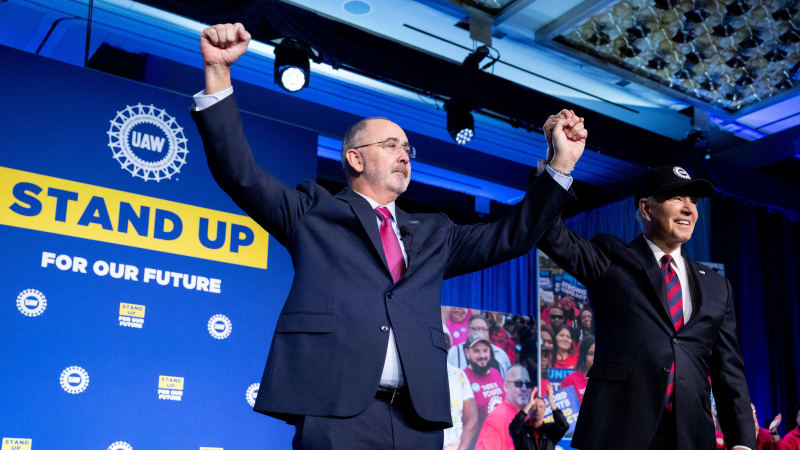WASHINGTON — The United Auto Workers Union has endorsed U.S. President Joe Biden’s reelection, backing a man the union’s outspoken leader, Shawn Fain, has at times publicly rebuked.
More than 380,000 UAW members are scattered in states that include Michigan, Pennsylvania and Wisconsin, where narrow margins have decided the overall winner of the past two presidential elections, and the powerful union’s backing could boost Biden’s campaign.
The Biden White House systematically courted Fain, looking past his occasional slights of the president during an autoworkers strike in 2023. Biden’s support helped resolve a nearly 45-day set of strikes that resulted in significant pay raises for workers.
Here are some key moments in their relationship:
March 25, 2023: Shawn Fain wins the race for UAW president, narrowly defeating incumbent head Ray Curry in a shakeup for the Detroit-based labor union.
May 3: Fain says the union is not yet endorsing Biden, a Democrat, for a second four-year term, citing concerns about electric vehicle
June 23: Fain calls a Biden Department of Energy loan to Ford and South Korea’s SK On for a battery factory a “giveaway,” adding, “Why is Joe Biden’s administration facilitating this corporate greed with taxpayer money?”
July 19: Fain visits the White House to discuss his negotiating strategy with Biden administration officials. When Biden learns of the meeting, he asks to meet Fain.
Aug. 27: The UAW votes overwhelmingly to authorize a strike at the Detroit Three automakers if an agreement isn’t reached before their contract expires on Sept. 14.
Sept. 4: “No, I’m not worried about a strike until it happens,” Biden says when asked if he was concerned about the possibility. “I don’t think it’s going to happen.”
Sept. 6: “He must know something we don’t know,” Fain says in response, adding that he was “shocked” by the comment. “Maybe the companies plan on walking in and giving us our demands on the night before. I don’t know, but he’s on the inside on something I don’t know about.”
Sept. 15: UAW begins its first simultaneous strikes at General Motors, Chrysler parent Stellantis and Ford.
Sept 19: As the UAW strike unfolds, the Biden administration is hobbled by a lack of legal authority to steer the talks and difficulty in figuring out Fain’s negotiating strategy and leadership style.
Sept. 22: Fain invites Biden to join striking workers at a picket line. Biden decides to visit Michigan to show support for the UAW strike against Detroit automakers, putting himself in the center of a dispute that has pitted his labor allies against major manufacturers.
Sept. 26: Biden joins a picket line with striking autoworkers in Belleville, Michigan, supporting their call for a 40% pay raise and saying they deserve a “lot more” than they are getting. Calling Biden’s visit a “historic moment,” Fain accuses CEOs of taking the profits and leaving workers to “fight for scraps.”
Sept. 27: Republican former President Trump goes to Michigan and speaks to several hundred blue-collar workers gathered at a non-union auto supplier in Clinton Township, Michigan, outside Detroit. He says it matters little whether striking union autoworkers secure a favorable deal in talks with America’s biggest carmakers because the shift to electric vehicles will soon make them obsolete.
Oct.4: Negotiators for the UAW and Ford narrow their differences on pay increases after a new offer from the automaker.
Oct. 20: Fain warns of more walkouts at U.S. truck and SUV factories unless the Detroit Three automakers improve wage and benefit offers, insisting companies could afford more than the record packages on the table.
Oct. 25: The UAW reaches a deal with Ford, the first of Detroit’s Big Three car manufacturers to negotiate a settlement to strikes joined by 45,000 workers since mid-September.
Oct. 28: The UAW reaches a tentative agreement with Chrysler-parent Stellantis.
Oct.30: The UAW reaches a tentative agreement with GM.
Nov. 9: Biden meets Fain in Belvidere, Illinois. Donning a red UAW T-shirt, Biden congratulates the UAW leader, and highlights the tentative contract agreements between the union and Detroit’s Big Three automakers that ended the nearly 45-day strike.
Nov. 20: The UAW says 64% of workers at the Detroit Three automakers voted to ratify new record contracts after the six-week targeted strike, as the union turns its attention to organizing foreign-owned and Tesla
